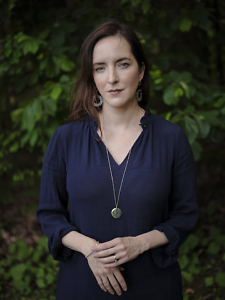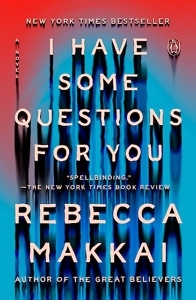The Uncanny Valley
Rebecca Makkai’s I Have Some Questions for You alternates between the #MeToo present and a 1990s mystery
Bodie Kane, the narrator of Rebecca Makkai’s I Have Some Questions for You, knows firsthand that media and audiences have insatiable appetites for stories about the deaths of attractive women. When Bodie was a student at the Granby School in New Hampshire, a former roommate drowned in an indoor swimming pool while most of her friends were celebrating a theatrical production. The media circus that followed turned the victim, Thalia Keith, into a tragic heroine and her alleged attacker, the school’s athletic trainer Omar Evans, into a twisted villain. Never mind the unanswered questions about the night’s events or the possibility of other suspects — the media ran with the story, one that, with the help of unscrupulous prosecutors, ended with Evans’ conviction.

That was in 1995, a miserable year for Bodie, who already felt like an outcast. By 2018, when she returns to Granby as a guest teacher, she has become a successful film professor and podcaster in Los Angeles whose show Starlet Fever focuses on the mysterious deaths of gorgeous actresses. She may feel “queasy” that those unfortunate Hollywood stars have “become public property,” but those qualms don’t stop her from capitalizing on lurid crimes. Now she wants her students to reinvestigate the case of Thalia Keith, with the unspoken goal of casting suspicions on the consummate #MeToo bad guy: the predatory older man.
The “you” of the title, as Bodie reveals early, is Dennis Bloch, Granby’s music teacher who works backstage with Bodie on theater tech and shows a dressing-room interest in Thalia. Mr. Bloch is the type of authority figure who seemed cool and playful in the ‘90s, gossipy and intimate, but who now appears to be a “creeper.” Bodie is not alone in reevaluating her youthful contact with male supervisors. “We were, all of us, casting a sharp eye back on the men who’d hired us, mentored us, pulled us into coat closets,” Bodie says. “I had to consider now that perhaps you were skilled at subtly eroding boundaries, making adolescent girls feel like adults.”
What distinguishes Makkai’s novel is her ambivalent depiction of Bodie. We can’t be sure if she views Denny Bloch fairly or is using him to work through psychological trauma of her own. In high school at Granby, she is withdrawn and insecure, a naïf from Indiana who suffered terrible losses in childhood. Her salvation comes from forming one lasting friendship, with Fran Hoffnung (now head of school at Granby), and from learning how to spy on her classmates. “I collected information about my peers the way some people hoard newspapers,” Bodie confesses. “I hoped this information would help me become more like them, less like myself — less poor, less clueless, less provincial, less vulnerable.”
 As in The Great Believers (2018), which looks back at the 1980s from the perspective of 2015, Makkai alternates between the 2018 time frame and Bodie’s experiences in the ‘90s. Bodie and Fran reminisce about drinking Zima and building a shrine to Kurt Cobain. As a freshman, Bodie learns that her Indiana notions of preppy fashion are outdated; she improvises a “goth grunge” look, buying “dark, oversized clothes” at thrift shops and donning “fishnets I carefully ripped, a fake army jacket.” Looking back, she and her friends (and this reviewer) see the early ‘90s as enchanted. “Ninety-four was the last good year for pop culture,” one of Bodie’s classmates observes. “We had the Cranberries, we had Bush, we had Veruca Salt and Smashing Pumpkins. The next year, what do you get? Dave Matthews takes over. Oasis and the Gin Blossoms. Straight downhill.”
As in The Great Believers (2018), which looks back at the 1980s from the perspective of 2015, Makkai alternates between the 2018 time frame and Bodie’s experiences in the ‘90s. Bodie and Fran reminisce about drinking Zima and building a shrine to Kurt Cobain. As a freshman, Bodie learns that her Indiana notions of preppy fashion are outdated; she improvises a “goth grunge” look, buying “dark, oversized clothes” at thrift shops and donning “fishnets I carefully ripped, a fake army jacket.” Looking back, she and her friends (and this reviewer) see the early ‘90s as enchanted. “Ninety-four was the last good year for pop culture,” one of Bodie’s classmates observes. “We had the Cranberries, we had Bush, we had Veruca Salt and Smashing Pumpkins. The next year, what do you get? Dave Matthews takes over. Oasis and the Gin Blossoms. Straight downhill.”
In 2018, Bodie projects a sexy image of confidence and control, yet the insecure Bodie occasionally peeks through the façade. She takes the teaching gig in part to gauge how far she’s come. “I was ready to measure myself against the girl who’d slouched her way through Granby,” she says. “In LA I knew in theory that I was accomplished … but I didn’t particularly feel, on a daily basis, the distance I’d come.” Back on campus, her old anxiety seeps in, causing her to avoid the dining hall for fear of encountering “my own awkward ghost.”
Makkai tightens the narrative screws with every chapter. As Bodie helps build the case for Omar Evans’ innocence, her life begins to crumble. Her desire to solve the case is amplified by the crises she faces personally and professionally. She needs to solve Thalia’s case to resuscitate herself. This novel demonstrates that our perceptions are colored by our experiences — not that murder and sexual predation are in the eyes of the beholder, but that reality itself shimmers with an aura of the unknown. Like the international student at Granby who mistakes fireflies for UFOs, we struggle to make sense of the world, to bridge the “uncanny valley” between our imaginations and the truth.

Sean Kinch grew up in Austin and attended Stanford. He earned a Ph.D. from the University of Texas. He teaches English at Montgomery Bell Academy in Nashville.


